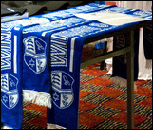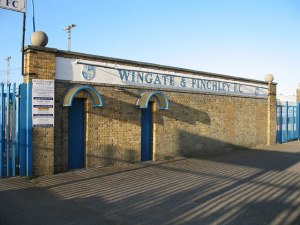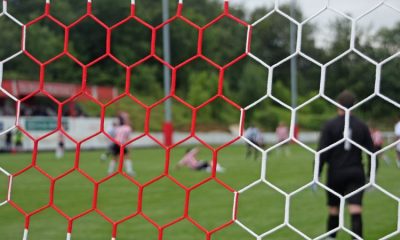Mike Bayly, commercial manager at newly promoted Wingate & Finchley and author of the excellent book Changing Ends, brings us his summary of his Non League season. Mike was also one of the driving forces behind Non League Day last year.
 To paraphrase Arkwright from Open All Hours, it’s been a funny old year. Twelve months ago, I was barely aware of Wingate & Finchley Football club’s existence. Now it consumes my every waking emotion. I am commercial manager, programme article writer, football in the community officer and most importantly of all, dedicated fan. I am too many people on match day, and the roles have been known to clash; it is difficult to play host in the boardroom one minute and tell an opposing centre back he is a diving bastard the next.
To paraphrase Arkwright from Open All Hours, it’s been a funny old year. Twelve months ago, I was barely aware of Wingate & Finchley Football club’s existence. Now it consumes my every waking emotion. I am commercial manager, programme article writer, football in the community officer and most importantly of all, dedicated fan. I am too many people on match day, and the roles have been known to clash; it is difficult to play host in the boardroom one minute and tell an opposing centre back he is a diving bastard the next.
Wingate & Finchley FC – nicknamed The Blues – started the season playing in the Ryman League Division 1 North, four levels below Football League 2. Although their Summers Lane ground is considered one of the finest at this level of football, it would be easy to drive past the stadium without even realising it is there. They, like many other non-league clubs, are a microcosm of the wider semi professional game. Despite the original Finchley FC dating back to the early 1870s, and their imperious art deco stand being over seventy years old, there are many in the borough who are seemingly oblivious to their existence. Not that I can cast a moral die. Despite living in North London since 2005, I only learnt of the club in the spring of 2010 when researching an article on Dudley Town FC. Chris Davies, Dudley’s press officer, held a similar role at Wingate & Finchley before moving away to the Midlands, and it was he who introduced me to The Blues club secretary when I was looking for a side to volunteer with. Twelve months later, I still find my allegiance to the club rather incongruous. Maybe it’s the palm trees, or the garden gnomes, or the avuncular presence of the older committee members, but something drew me in and has refused to let go ever since.
Such unconventional support is in keeping with a lot of the club’s recent history. Although the merger of Wingate FC and Finchley FC happened twenty years ago, the club still appears to be suffering from an identity problem. This is not unusual amongst mergers, but Wingate & Finchley’s scenario is slightly more complex in that Wingate FC was historically a Jewish club, set up to fight anti-Semitism after the second world war. Whilst the Star of David forms part of the club’s badge, there is little else on the playing side to bind to its Jewish heritage. Of the current first team squad, only ex Dagenham & Redbridge midfielder Sam Sloma hails from Jewish descent, although there are a number of Jewish boys who make up the club’s highly successful youth teams.
 Off the pitch, matters are different. There is a strong Jewish presence on the committee and in ex Wingate player and pipe smoking aficionado Harry Kaufman, stand’s one of the club’s staunchest fans. Unfortunately, this only muddies the waters with the local press and the immediate community. The Jewish papers are somewhat indifferent to the club, either through lack of Jewish players or because the team play on the Sabbath. Many of the local Jewish population are not interested in following the team for the same reasons. Yet paradoxically, many of the non-Jewish community still regard Wingate & Finchley as “a Jewish club”, and for reasons that can be only speculated over, have little or no interest in following the side.
Off the pitch, matters are different. There is a strong Jewish presence on the committee and in ex Wingate player and pipe smoking aficionado Harry Kaufman, stand’s one of the club’s staunchest fans. Unfortunately, this only muddies the waters with the local press and the immediate community. The Jewish papers are somewhat indifferent to the club, either through lack of Jewish players or because the team play on the Sabbath. Many of the local Jewish population are not interested in following the team for the same reasons. Yet paradoxically, many of the non-Jewish community still regard Wingate & Finchley as “a Jewish club”, and for reasons that can be only speculated over, have little or no interest in following the side.
For fans of the original Finchley FC it must be a sore subject, especially when journalists have been known to remark (rather inaccurately one might add) that the Finchley aspect of the club now exists in name only. Whilst Finchley were never a giant of the amateur game, plying much of their existence in the old Athenian league, it was a club steeped in history. Founded in 1874, it stood as one of the oldest clubs in England, and during their 1950s heyday, Finchley beat Crystal Palace 3-1 in the FA Cup at Summers Lane in front of a capacity crowd (which depending who you speak to could have been anything from 3000 to 8000) Part of this celebrated side was one George Robb, who would latterly play for Tottenham Hotspur and England, his only cap coming during the national side’s 6-3 trouncing against a Ferenc Puskas inspired Hungary. In more recent times, Finchley had the Rt. Hon. Margaret Thatcher, M.P as their patron, as detailed in a 1987 Vauxhall Opel League programme against Vauxhall Motors (not the Vauxhall Motors who play in the Conference North I might add – this was the old Luton works team who disbanded around 1991. It would have been amusing had they ever played their namesakes from Ellesmere in a cup match; I would have loved to hear James Alexander Gordon read that one out on sports report at 5pm: “FA Cup 1st round – Vauxhall Motors 1 Vauxhall Motors 1”)
Pre-merger, crowds at Summers Lane hovered around the 200 mark; statistics suggest that average gates in recent campaigns have barely reached three figures. Given the club’s proximity to Barnet, Arsenal and Tottenham, this isn’t really surprising, but over the course of a generation it is fair to say that a number of fans have stopped watching football in N12. This may be down to faltering performances on the pitch or a number of other speculative factors, but Wingate & Finchley FC appeared to be a side beset by a lack of interest.
The arrival of loquacious chairman Aron Sharpe in 2007 signalled a change in the club’s fortunes. Under manager Michael stone, The Blues finished a respectable 7th during the Ryman North 2008-09 season, and reached the final qualifying round of the FA Cup. Stone left shortly afterwards to take up a role at Rushden & Diamonds, to eventually be replaced by the young and relatively unknown David Norman. Norman guided the club to a record 3rd place the following season, before losing at home in the play offs to local rivals Enfield Town. Expectations were high for the following campaign; I arrived at Wingate & Finchley on the crest of a wave.
 A solid pre-season saw The Blues beat Barnet 1-0, and hold a full strength Rushden & Diamonds to a 1-1 draw. Unfortunately this form seemed to evaporate once the important games started. An FA Cup preliminary round exit to Northwood was an instant low point, and two successive hammerings against Heybridge Swifts (on non-league day for added salt in the wound) and Needham Market started cause for concern on the terraces. The next (and possibly best) game of the season saw a 4-4 away draw against bitter rivals Potters bar, with a last minute equaliser securing a point after the home side led 3-1. This result seemed to spearhead the side on, and over the next eleven league games, The Blues won nine and drew one, including a superb 2-1 win over eventual league winners East Thurrock.
A solid pre-season saw The Blues beat Barnet 1-0, and hold a full strength Rushden & Diamonds to a 1-1 draw. Unfortunately this form seemed to evaporate once the important games started. An FA Cup preliminary round exit to Northwood was an instant low point, and two successive hammerings against Heybridge Swifts (on non-league day for added salt in the wound) and Needham Market started cause for concern on the terraces. The next (and possibly best) game of the season saw a 4-4 away draw against bitter rivals Potters bar, with a last minute equaliser securing a point after the home side led 3-1. This result seemed to spearhead the side on, and over the next eleven league games, The Blues won nine and drew one, including a superb 2-1 win over eventual league winners East Thurrock.
The club were also taking notable scalps in their respective cup outings, beating Wealdstone, Harrow and Bury Town of the Ryman Premier League along the way. Off the pitch however, crowds remained disappointing. Only 34 turned up to watch the London Senior Cup match against Kingsbury London Tigers, and even more alarmingly, just 77 for the top of the table clash against the aforementioned East Thurrock. Admittedly both were midweek matches, competing against the spectre of live (champions league) football on TV, but nonetheless it was depressing to see a club at the pinnacle of their game being so poorly supported.
 A feisty New Year’s Day encounter against Potters Bar saw The Blues go 2-0 up and then contrive to lose 4-2 after having two men sent off. This was followed by a turgid home defeat to Ware, and suddenly, the club’s grip on the play offs was looking weak. Whether by accident or design, Wingate & Finchley then won eight games on the bounce, including an astonishing 3-0 home win over Maldon & Tiptree with just eight men and centre back Ahmet Rifat in goal. The depleted side had much to do with the card happy referee, who looked ashen-faced in the boardroom afterwards. Being a club representative, you get to see to see match officials as human beings, not figures of derision. Most are alarmingly young at this level of football, and any built up vitriol soon disappears within the confounds of the clubhouse when you see the man-child stood there in front of you collecting his brown pay packet, for what is a totally and utterly unforgiving line of work.
A feisty New Year’s Day encounter against Potters Bar saw The Blues go 2-0 up and then contrive to lose 4-2 after having two men sent off. This was followed by a turgid home defeat to Ware, and suddenly, the club’s grip on the play offs was looking weak. Whether by accident or design, Wingate & Finchley then won eight games on the bounce, including an astonishing 3-0 home win over Maldon & Tiptree with just eight men and centre back Ahmet Rifat in goal. The depleted side had much to do with the card happy referee, who looked ashen-faced in the boardroom afterwards. Being a club representative, you get to see to see match officials as human beings, not figures of derision. Most are alarmingly young at this level of football, and any built up vitriol soon disappears within the confounds of the clubhouse when you see the man-child stood there in front of you collecting his brown pay packet, for what is a totally and utterly unforgiving line of work.
A 3-2 away defeat to Great Wakering Rovers in February signalled a slump in form which saw the club win just one of its next eight matches and slip down to 8th place in the league. Of these, a 2-2 home draw against Enfield Town provided the most controversial moment of the season, ending in a mass brawl on the pitch and several spectators being asked to leave the ground. However, cup form during this period was nothing short of outstanding. Maldon were beaten 2-1 in the Ryman League cup semi-final, and Premier League Tooting & Mitcham were thrashed 3-0 at the same stage of the London Senior Cup.
The turning point of the season was the Ryman League Cup final victory over Dulwich Hamlet. A 2-0 win in front of a 502 crowd at Metropolitan Police’s Imber Court not only provided the club’s first silverware in sixteen years, but also sparked the impetus to take five wins and one draw from the last six games, including a remarkable 3-2 away win over Brentwood on the final day, meaning the club would once again finish 3rd and gain home advantage in the play offs, this time against Harlow Town.
Although Harlow were the form team going into the play offs (and conspiracy theories were rife that Brentwood were more than happy to be playing Needham Market in the other semi final tie) The Blues came through 4-2 winners in extra time, after the match had finished 1-1. The first fifteen minutes of extra time saw the best football played by the side all season, and they deservedly booked their place in the play off final. Remarkably, Brentwood beat Needham Market 3-1 away to set up an improbable home tie at Summers Lane, which would have seemed unthinkable just a few weeks before.
Unfortunately, the fixture Gods were not kind. The play off final, scheduled for Saturday 7th May, not only clashed with the FA Trophy final, but also Barnet’s massive league game with Port Vale. A crowd of nearly 4500 at Underhill – almost double their average gate – meant a good number of neutrals in the area gravitated towards the must win relegation battle just miles down the road. Although the 528 at Summers Lane was a club record, there is no doubt that had circumstance been different, it could have been nearer 1000.
 It would take a goal three minutes from the end of extra time to secure a 3-2 win for Wingate & Finchley, amid some of the most delirious scenes I have ever witnessed at a football match (See videohere). For a club with sparse crowds and a lack of singing, the chants, Vuvuzelas and pitch invasion for the third goal were all rather surreal; this is the same side who played in front of just 56 fans at home to Tilbury in November. By the time the London Senior cup final came round three days later on Tuesday, it still hadn’t really registered the club had been promoted. After the draining jubilation of Saturday, it was hard to get motivated again for what was really a cosmetic end to the season; the milk of human emotion had almost run dry.
It would take a goal three minutes from the end of extra time to secure a 3-2 win for Wingate & Finchley, amid some of the most delirious scenes I have ever witnessed at a football match (See videohere). For a club with sparse crowds and a lack of singing, the chants, Vuvuzelas and pitch invasion for the third goal were all rather surreal; this is the same side who played in front of just 56 fans at home to Tilbury in November. By the time the London Senior cup final came round three days later on Tuesday, it still hadn’t really registered the club had been promoted. After the draining jubilation of Saturday, it was hard to get motivated again for what was really a cosmetic end to the season; the milk of human emotion had almost run dry.
Despite making numerous changes to the starting line up, Wingate & Finchley beat their Ryman Premier League opponents Hendon 3-1 to secure an astonishing treble. Trying to be objective, it would be hard to think of a non-league club that has had a more successful season; credit must go to the players and backroom staff for doing a quite magnificent job. Yet the last twelve months have been more than a celebration of events on the pitch. The volunteer committee, of which I am a proud member, have gone to extraordinary lengths to promote the club in the wider area. Our football in the community work has seen us deliver a number of school assemblies, as well as attend recruitment fairs aimed at providing young adults with volunteer opportunities.
The club’s disability scheme – which has received patronage from Lord Triesman – continues to develop, with a view to entering an affiliated side in the Camden Step League next season. We have raised thousands of pounds for local charities through our sponsored walk initiative, and will be undertaking a similar event next year. Our school of excellence programme goes from strength to strength, and at youth team level, the U15s secured a quadruple of trophies, generating scouting interest from several professional clubs. Moreover, the experience of being so heavily involved with a club at this level has only strengthened my belief that non-league football is so vital to the health of the national game, something that James Doe and myself are so keen to promote through the non-league day campaign. Non league clubs are genuine hubs of the community and provide opportunities for people from all ages, abilities and backgrounds to be part of something truly special. There are times when you question your sanity, like the London Senior Cup quarter final game away to Erith & Belvedere when just 28 people turned out to watch on a bitterly cold night. Yet this camaraderie is part of what makes non-league football so enchanting; we are all in it together against some very oppressive odds.
 Next season will bring new challenges, new grounds and hopefully new fans. The truth is support will always be inextricably linked to a club’s position in the pyramid, and one would hope promotion will encourage the local population to show more of an interest. Attendances are up twenty percent on last season, and many of those at the play off final were watching for the first time, despite some only living a misplaced shot from the ground. Whether these same people will return on a frostbitten February evening against Horsham or Hastings remains to be seen: the realist in me suspects not. Being a non-league fan means you often live in an inconspicuous, almost bygone world of English football, and for some, this is an untenable situation. I, on the other hand, revel in this parallel universe. As David Gray once wrote, “if life’s just a living room, I’m in the hall and I’m glad”
Next season will bring new challenges, new grounds and hopefully new fans. The truth is support will always be inextricably linked to a club’s position in the pyramid, and one would hope promotion will encourage the local population to show more of an interest. Attendances are up twenty percent on last season, and many of those at the play off final were watching for the first time, despite some only living a misplaced shot from the ground. Whether these same people will return on a frostbitten February evening against Horsham or Hastings remains to be seen: the realist in me suspects not. Being a non-league fan means you often live in an inconspicuous, almost bygone world of English football, and for some, this is an untenable situation. I, on the other hand, revel in this parallel universe. As David Gray once wrote, “if life’s just a living room, I’m in the hall and I’m glad”
I couldn’t have put it better.
You can follow Mike on Twitter here.
Author


The Football Coach
How To Win Football Bets: A Betting Strategy To Help You Win Every Time

The Football Coach
How long is a football pitch? The complete pitch size guide











